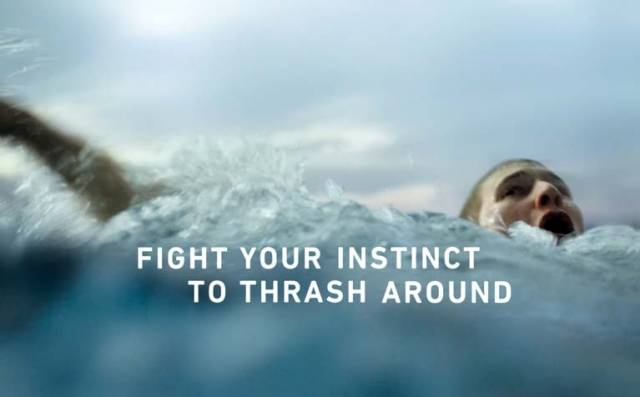The RNLI, in partnership with the GAA, through their Healthy Club Programme, has this morning (Thursday 7 June), launched its 2018 national drowning prevention campaign, Respect the Water, at Páirc Uí Chaoimh in Cork. The campaign this year will see RNLI volunteers visit GAA clubs to share drowning prevetion advice with young players.
The Respect the Water campaign is now in its fifth year and the charity is urging anyone who finds themselves in trouble in cold water to follow the FLOAT message and stay calm and ‘float’ on your back for a short time to regain control of your breathing.
The RNLI is calling on the public to practice the ‘float’ survival skill – a simple skill that could save a life. This skill was demonstrated at the launch by Union Hall RNLI volunteers in the River Lee outside Páirc Uí Chaoimh as a number of GAA club representatives from Cork watched. Cork footballer, Brian Hurley, who is also an RNLI Player Ambassador for the campaign was also in attendance and explained his reason for getting involved.
‘I grew up in Union Hall, right beside the water and I know how great it is to have it on your doorstep. None of us live too far away from it and we should enjoy it but we also need to look out for the dangers and know what do if we get into trouble or see someone else in trouble. We have an incredible opportunity with both the RNLI and the GAA to start talking directly to young people about it and hearing what they think.’
"Under the initiative this year, 39 volunteer ambassadors from lifeboat stations across Ireland will work with GAA clubs"
Under the initiative this year, 39 volunteer ambassadors from lifeboat stations across Ireland will work with GAA clubs in their communities to highlight the risks of drowning and to share lifesaving advice. The key message of the campaign will be ‘Float’. Volunteers who have been trained to become ambassadors will be visiting clubs across the country to give talks and share drowning prevention advice.
Alan Cott is the RNLI’s GAA Ambassador in Ballycotton. Alan who is a deputy mechanic at Ballycotton RNLI and lost his brother to drowning in a fishing tragedy 12 years ago.
He believes that if one person’s life can be saved through the Respect the Water campaign and through the Float message he delivers to GAA clubs in his community, then the lives of many others will also be saved from the pain and heartache of losing a loved one to sea.
‘My brother Glynn was one of three onboard a fishing trawler that sank five or six miles south of Hook Head in Waterford on the 29 March, 2006. There was one survivor who was found on an upturned liferaft but the bodies of my brother Glynn who was 31, and a family friend, were never recovered.’
Alan joined the volunteer lifeboat crew in Ballycotton four years ago: ‘I wanted to join because I felt if I could provide any help to prevent something like this happening it would be worth it and even if I couldn’t help, I might be able to help bring a loved one home. I found in the RNLI that this organisation does make a difference, I have seen the professionalism of the volunteers and the kind-heartedness of people - it is just amazing.
‘When the GAA ambassador opportunity came along, I was keen as I also play for my local club, Russell Rovers GAA. I believe if one person can remember the float message and if one life can be saved, then the lives of 10, 15 or 20 others, will also be saved from the grief of losing a loved one.’
Speaking at the launch, RNLI Lifesaving Manager Sean Dillon said: ‘Losing someone to drowning is a shattering experience. Sadly as we have seen recently we are still losing loved ones to drowning. We need to talk directly to people, especially our young people to make them aware of risks and also to know what to do. We hope that our safety campaign and education work, along with our colleagues work in Irish Water Safety and the Irish Coast Guard will contribute to a reduction in deaths. We must all keep sharing lifesaving advice. One drowning, is one too many.’
The RNLI has created a new video here explaining the five steps to floating, to help give people the confidence to be able to float if they find themselves in trouble in cold water.
For those planning to go into the water, the best way to enjoy it safely is to choose a lifeguarded beach and swim between the red and yellow flags – the area most closely monitored by the lifeguards. And if you see someone else in danger in the water at the coast, fight your instinct to go in and try to rescue them yourself, instead call 999 or 112 and ask for the Coast Guard.’
The Respect the Water campaign will run throughout the summer with advertising across cinema, outdoor posters, radio, online, and catch-up TV channels.
































































